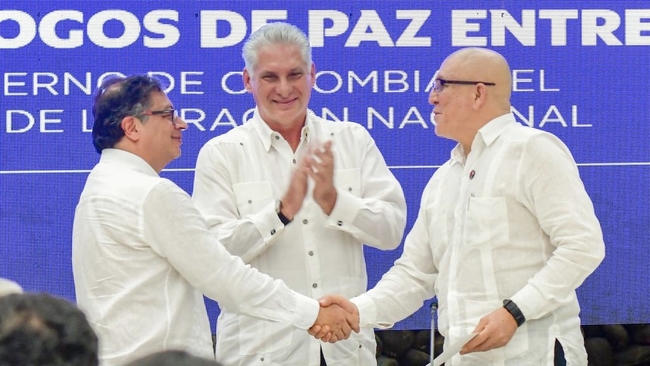Against all reason, Cuba remains on the US State Sponsors of Terrorism list
People's Dispatch | Wednesday, 12 July 2023 | Click here for original article

The Colombian government led by President Gustavo Petro and the National Liberation Army (ELN) guerrilla group signed an agreement on a six-month bilateral ceasefire on June 9.
Cuba was added to the US’s “State Sponsors of Terrorism” (SSoT) list in 2021 by Donald Trump. Biden has not removed this designation, despite indications throughout his presidency that he would turn away from Trump’s extreme anti-Cuba positioning as well as the lack of a clear reason to keep it there. The Cuban people are already suffering under a 60-year-plus blockade. The SSoT designation has far-reaching consequences that contribute to shortages of daily necessities such as fuel and medicine, inhibit humanitarian aid, discourage financial transactions and trade, to name only a few.
Cuba solidarity groups including the National Network on Cuba and the People’s Forum are organizing a march in Washington, DC on Sunday June 25 to call for Cuba to be taken off the State Sponsors of Terrorism list. The protest is being called under the slogans: “End US Economic Terror Toward Cuba” and “End US Imperialism and Global Terror.”
“The designation of Cuba as a State Sponsor of Terror is not only inaccurate but has dire consequences for regular Cuban people in getting access to basic food, medicine, and supplies,” Hannah Craig, of the People’s Forum, told Peoples Dispatch. “Meanwhile, working people in the US suffer from lack of adequate housing, healthcare, and education. This reality makes it clear where the real terror lies—it’s US policy that denies sovereignty, dignity, and the very right to live.”
Cuba was first designated a “state sponsor of terrorism” by the United States in 1982 by right-wing President Ronald Reagan. President Barack Obama removed the designation in 2015 in the context of his efforts to warm relations with Cuba, but President Donald Trump put Cuba back on the list amidst his last chaotic days in office.
State sponsor of peace
The US government at the time claimed several reasons for this designation, including Cuba’s hosting of the peace delegation of the National Liberation Army (ELN) during the period when the peace process between the ELN guerilla organization and the Colombia government had been suspended. The peace talks were suspended by Colombian President Iván Duque in 2019, after months of delays and sabotage by Duque’s government. Shortly after, he called for the arrest and extradition of the entire ELN peace delegation, which was in Havana waiting for the next cycle of talks to begin. Cuba did not comply with this request as they are a guarantor of the peace talks and were obligated to protect participants. Because Cuba did not comply, the US used this as justification to include Cuba on the State Sponsors of Terrorism list.
After winning the presidential elections in 2022, Gustavo Petro stated that one of his first actions as president would be to resume talks with the ELN, which he fulfilled. The talks resumed in August 2022 and have been transformative for the people of Colombia, as the two parties just agreed on a historic bilateral ceasefire.
Colombian President Gustavo Petro, condemned the “state sponsor of terrorism” designation for Cuba as a “profound injustice…a stab in the back…that must be rectified.” He said this as he signed the ceasefire agreement on June 9 in Havana. Petro has been adamant that Cuba be taken off this designation pushed by his predecessor.
The ELN talks remain the main stated justification for Cuba’s inclusion on the State Sponsors of Terrorism list. However, even the spokespeople for the US government have been inconsistent in this regard. Cuban journalist Liz Oliva Fernández asked State Department deputy spokesperson Vedant Patel why Cuba was still on this list. He responded, “The regime has a long track record of egregious human rights abuses, suppression of a free press, suppression of civil society, and other key factors that continue to keep them on that list.” None of these claims have anything to do with terrorism.
Ironically, the US itself has promoted several terrorist attacks on Cuban soil.
Limitless consequences
On paper, the sanctions stemming from Cuba’s inclusion in the list are limited, but in reality, they are limitless. The specter of this designation hangs over Cuba, as countries and potential business partners refrain from trading with the country and over comply with sanctions in fear of angering the US or incurring penalties. This fear contributes to the goods shortages that the Cuban people already experience due to the blockade, such as the ongoing fuel deficit.
Not even humanitarian aid is safe. According to the advocacy organization the Washington Office for Latin America, “Fearful of being accused of abetting terror and the mammoth fines that an infraction entails, most banks refuse to process Cuban payments and have frozen funds for permitted religious and humanitarian activities, requiring additional licensing.”
Recently, anti-Cuba lawmakers in the US Congress have been attempting to codify Cuba’s designation on the list into law. Right now, Biden can take Cuba off at the stroke of a pen, but this law would render that impossible. Meanwhile, several progressive city council members in New York City have recently introduced a resolution to end the blockade against Cuba and remove it from the SSoT list.






